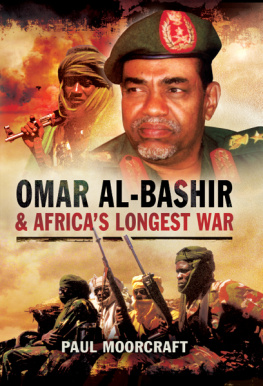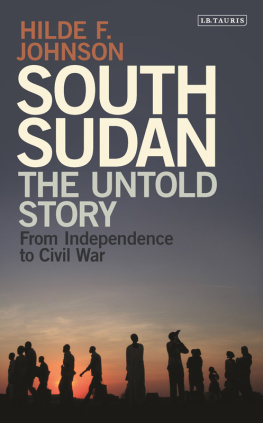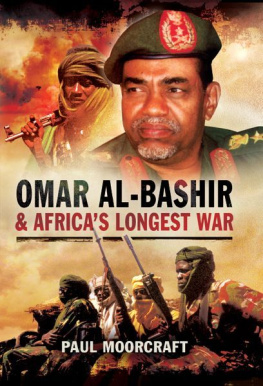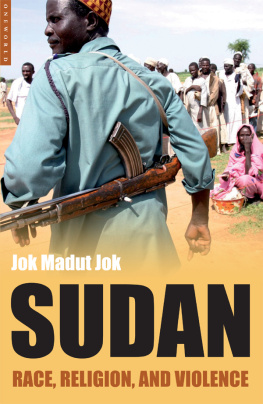SUDAN
SUDAN
DARFUR AND THE FAILURE OF AN AFRICAN STATE
RICHARD COCKETT
YALE UNIVERSITY PRESS
NEW HAVEN AND LONDON
Copyright 2010 Richard Cockett
The right of Richard Cockett to be identified as author of this work has been asserted by him in accordance with the Copyright, Designs and Patents Act 1988.
All rights reserved. This book may not be reproduced in whole or in part, in any form (beyond that copying permitted by Sections 107 and 108 of the U.S. Copyright Law and except by reviewers for the public press) without written permission from the publishers.
For information about this and other Yale University Press publications, please contact:
U.S. Office: sales.press@yale.edu yalepress.yale.edu
Europe Office: sales@yaleup.co.uk www.yalebooks.co.uk
Set in Janson Text by IDSUK (DataConnection) Ltd
Maps by Peter Winfield
Printed in Great Britain by Hobbs the Printers Ltd, Totton, Hampshire
Library of Congress Cataloging-in-Publication Data
Cockett, Richard.
Sudan : Darfur and the failure of an African state / Richard Cockett.
p. cm.
Includes bibliographical references.
ISBN 978-0-300-16273-8 (hardback : alk. paper) 1. SudanHistoryDarfur Conflict, 2003- 2. SudanPolitics and government1985- I. Title.
DT159.6.D27C63 2010
962.404'3dc22
2009052118
A catalogue record for this book is available from the British Library.
10 9 8 7 6 5 4 3 2 1
2014 2013 2012 2011 2010
CONTENTS
ACKNOWLEDGEMENTS
Just like the various international peacekeeping forces that have tried to bring some sort of order to Sudan, this book is also something of a hybrid. It is part journalism and part history, reflecting my two chosen careers (to date).
Sudan: Darfur and the Failure of an African State is mainly the product of six trips to Sudan undertaken between 2005 and 2010 for The Economist while I was Africa editor of the paper. Yet the book should also, I hope, be rooted in the academic discipline of history. For before joining The Economist I was a lecturer in history, politics and political thought for ten years or so at the University of London, principally at Royal Holloway and Bedford New College, where I gained a PhD in history in 1988.
I thus have two sets of intellectual and professional debts to record here. I owe my enduring love of history to my two schoolmasters, Dr Peter Carter and Oliver Ramsbotham; their classes continue to inspire everyone who was lucky enough to be present, even if it is now thirty-odd years ago. And at The Economist, Gideon Rachman and Emma Duncan showed me how to be a journalist, in as far as what we do at the paper can be described as such. Peter David brought me into the Foreign Department and let me loose in Africa, while Xan Smiley accepted my frequent absences in the deserts and marshes of Sudan with good grace. The editor, John Micklethwait, generously gave me a substantial amount of time off to research and write the book; this also allowed me time to travel to America, France and Chad to do some extra interviews. Its one of the papers better intellectual traditions that journalists are positively encouraged to explore their favourite subjects at greater length. Also at The Economist, Peter Winfield helped with the maps; Bagehot and the famous author provided the cheer and good company. I am grateful to them all. Nonetheless, all the views expressed in this book are my own, independent of the editorial position of The Economist.
I must also thank several people who have guided me, both intellectually and sometimes physically, around the country and its rich history. Some of them are also victims of a similar obsession with Sudan some of them are actually Sudanese. They have been my companions throughout this project, often intervening to help and sharpen my thinking at crucial moments. They are Aicha Elbasri, Blake Evans-Pritchard, Richard Gowan, Mo Ibrahim, Hadeel Ibrahim, Laura James, Jonathan Ledgard and Athanasios and George Pagoulatos, the proprietors of the Acropole Hotel in Khartoum, the best establishment of its kind in Africa and reason alone to keep coming back to the country. I am also indebted to Alex de Waal for reading part of the manuscript, and to Juliana Barrett for sharing her insights on southern Sudanese place-names and for doing the index. In the end though, all the judgements in this book are mine, as are the misjudgements.
At Yale University Press Phoebe Clapham snapped the book up encouragingly quickly and has guided the whole process through firmly and efficiently. Thanks to her, and to my agent Araminta Whitley.
I spoke to scores of Sudanese people, in all walks of life, for the book. Some of them feature by name in the following pages. However, I would also like to thank those below who agreed to do more formal interviews with me, often on several occasions and sometimes over the course of a couple of days:
Ali Abdulrahman Abbas; Al Tayib Zein al-Abdin; Jimmy Abirigo; Ahmed Hussein Adam; Malik Agar; Saif Ahmad; Ali Abdalla Ali; Pagan Amum; Elthar Bashery Ali; Ghazi Atabani; Omer Abdel Ati; Cage Banseka; Sajoh Bar; Saif Adeen al-Bashir; Ahmed Bedawi; Oliver Bercault; Sam Brownback; Margie Buchanan-Smith; Jack Christofides; Yu Chunhua; Luigi Cignolini; Richard Cizik; Ian Cliff; Orla Clinton; Baroness Caroline Cox; Gillian Cull; Francis Deng; Nick Donovan; Jan Egeland; John Eibner; Aicha Elbasri; Abduljabbar Abdellah Fadul; Mia Farrow; Alberto Fernandez; Michael Gerson; Alan Goulty; Lise Grande; David Gressly; Diane de Guzman; Jonah Fisher; Jerry Fowler; Mark Hanis; Simon Haselock; AbuZeid el-Hassan; Randa Hassan; Michael Hoare; Nathan Holt; Mo Ibrahim; Amira Idris; Margunn Indreboe; Ronald Isaacson; Omer Ismail; Chris Johnson; Hassan Kambal; Dr Mukesh Kapila; Asha el-Karib; Sayid el-Khatib; Monyluak Kuol; Ring Kuol; Patricia Lane; Osama Latif; Ian Levine; Gill Lusk; Riek Machar; Adam Madibu; Abda al-Mahdi; Sadiq al-Mahdi; Mubarak A.F. al-Mahdi; Bona Malwal; Rosalind Marsden; Andrew Marshall; Kuol Athian Mawien; Opheera McDoom; Ruth Messinger; Hafiz Mohamed; Abdul Mohammed; Stephen Morrison; Osman Mudawi; Albaqir Alafif Mukhtar; Theo Murphy; Robert Muwanga; Deborah Mwania; Andrew Natsios; Caroline Nursey; David Nyuma; Michael ONeil; Salih M. Osman; Athanasios Pagoulatos; George Pagoulatos; Sarah Pantuliano; Donald Payne; Andrew Pendleton; Sir Derek Plumbly; Sir Kieran Prendergast; Bashir Adam Rahma; Philip Rowe; Salim A. Salim; Jago Salmon; Mario Samja: Jill Savitt; Michael Scheuer; Amy Scott; Derk Segaar; David Shinn; Clare Short; Amal Sidahmed; Jerzy Skuratowicz; Hugo Slim; Gayle Smith; Charles Snyder; Eythan Sontag; Lazarus Sumbeiywo; Peter Sweetnam; Elias Taban; Khalid Tigani; David, Lord Triesman; Hassan al-Turabi; Oliver Ulich; Gloria White-Hammond; Frank Wolf; Amin Salih Yasin.
I have tried to make this book as transparent and accessible as possible, thus attributing all the quotes in the book to the people who gave them to me at the appropriate point in the text. Only very occasionally have I been obliged to hide the identity of a source; this is usually because naming him or her in relation to a particular incident or point of view would jeopardize their current employment or adversely affect their residency in Sudan. Similarly, where it is appropriate, references indicate the sources I used for other information; there is also a selected bibliography at the end. In terms of the Arabic translation of words, I have chosen to be inconsistent. Peoples names are given in English as they chose to give their names to me, for instance, rather than adhering to some notional set of rules which does not really exist in Arabic. Likewise, place names in Arabic are given as they are most commonly rendered in the English-language literature on Sudan; they may not be spelt the same in all books on Sudan.
Next page





